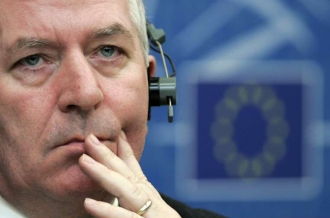Aidan Curran posted on February 16, 2008 14:58
The most important Irishman in the music industry these days isn't Bono or Paul McGuinness or even Louis Walsh. It's Charlie McCreevy.
 Our former finance minister (right, listening to his fave tunes) is the European Commissioner with responsibility for the internal market and services - in other words, how we in the EU trade amongst ourselves.
Our former finance minister (right, listening to his fave tunes) is the European Commissioner with responsibility for the internal market and services - in other words, how we in the EU trade amongst ourselves.
What has this got to do with the music biz? Well, while you were canoodling with your significant other on Saint Valentine's Day, McCreevy really did the dog on it, and gave the record industry their heart's desire. On February 14 he announced his intention to extend the duration of copyright for a performer's recordings, from 50 years to 95 years.
Under current legislation, a composer enjoys seventy years of copyright protection, while the interpreter's rights lapse after fifty. While composer-performers like The Beatles were not due to lose their writing copyright anytime soon, use of their recordings would have been up for grabs. The situation was even bleaker for non-writing singers and musicians active in the early-'60s and before, who were fearing severe loss of income in the coming years.
French record companies, for instance, are surely fuming that some rights have lapsed on many recordings by Edith Piaf, especially given the renewed interest generated by the current Oscar-nominated biopic. Similarly, there's no copyright on many performances by Maria Callas, still the world's most popular diva, and Django Reinhardt.
Piaf's version of 'La Vie En Rose', for instance, is in the public domain and now appears on many of the cheap Paris compilations touted at tourists nostalgic for pre-war Paris or post-war Saint-Germain. Those compilations also feature tracks by the likes of Josephine Baker, Charles Trenet and Lucien Boyer - perennial favourites who could still make loads of money for record companies were they still in copyright. Those tourists buy the compilations more for souvenir value than listening pleasure, but it still represents a considerable spend on music. Understandably, French record companies are unhappy at the idea of losing the copyright income of ever more established stars.
Imminent on the public-domain horizon (from a French perspective) were lucrative back catalogues by Johnny Hallyday and Charles Aznavour. McCreevy's announcement ensures that Hallyday (still recording and touring to enormous success) and his generation, not to mention their record companies, can continue to reap royalties from a lifetime of recordings.
The extension to 95 years follows the lead of the United States, where the Copyright Term Extension Act (popularly known as the Sonny Bono Act, after the late singer/senator) of 1998 already guarantees a near-century of rights.
Europe's music industry has been lobbying on the issue for some time. On the European Commision website you can even watch a video of a 2006 meeting between Commissioner McCreevy and Lucien Grange, CEO of Universal Music.
Any mention of profit from art and music is always a sensitive and emotive subject, and the music industry's line is usually something like 'we're protecting the rights of smaller artists'. In this regard, McCreevy is certainly on-message: "I am not talking about featured artists like Cliff Richard or Charles Aznavour," he said in his announcement. "I am talking about the thousands of anonymous session musicians who contributed to sound recordings in the late fifties and sixties. They will no longer get airplay royalties from their recordings. But these royalties are often their sole pension".
True, no doubt, but you can be sure that it wasn't nameless sessioners that Grange was seeing McCreevy about. The references to Cliff Richard and Charles Aznavour indicate something more than the Commisioner's listening habits: one English and one French star to (subconsciously, perhaps) represent the biggest record markets (and thus, strongest lobbies) in Europe - if we count out U2 and ABBA, English and French acts sell more internationally than acts from any other EU states (the internal market, as we saw).
McCreevy's proposal is expected to be adopted by the Commission before its summer recess. Cliff Richard can then go on his summer holidays, no more worries for quite a long while.
More ...
[Read more...]